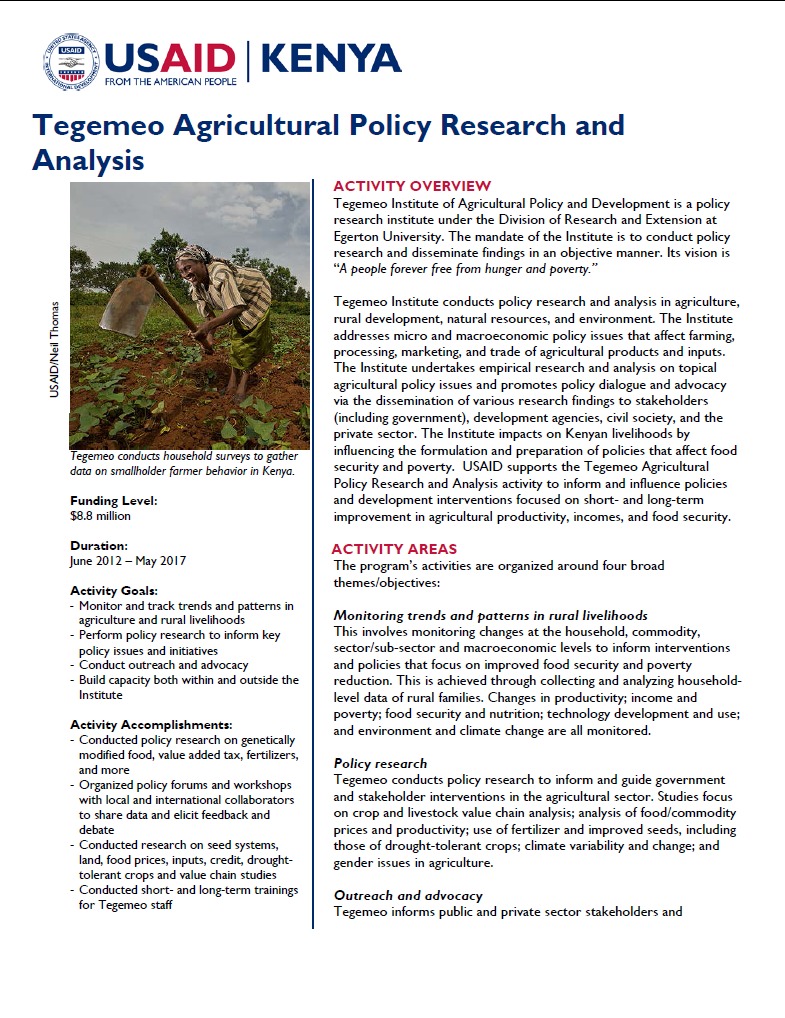Funding Level:
US$8.8 million
Duration:
June 2012 – May 2017
Activity Goals:
- Monitor and track trends and patterns in agriculture and rural livelihoods
- Perform policy research to inform key policy issues and initiatives
- Conduct outreach and advocacy
- Build capacity both within and outside the Institute
Activity Accomplishments:
- Conducted Feed the Future population survey
- Conducted research on seed systems, land, food prices, inputs, credit, drought-tolerant crops and value chain studies
- Organized policy forums and workshops with local and international collaborators to share data and elicit feedback and debate
- Conducted short- and long-term trainings for Tegemeo staff
Implementing Partner:
Tegemeo Institute, Egerton University
Key Partners:
Ministry of Education, Egerton University, Ministry of Agriculture, Livestock and Fisheries, Kenya Agricultural Research Institute
Activity Location:
Nairobi, Kenya – affecting policy nationwide
ACTIVITY OVERVIEW
Tegemeo Institute of Agricultural Policy and Development is a policy research institute under the Division of Research and Extension of Egerton University. The mandate of the Institute is to conduct policy research and disseminate findings in an objective manner. Its vision is “A people forever free from hunger and poverty.”
Tegemeo Institute conducts policy research and analysis in agriculture, rural development, natural resources and environment. The Institute aims to address micro and macroeconomic policy issues that affect farming, processing, marketing, and trade of agricultural products and inputs. Tegemeo Institute undertakes empirical research and analysis on topical agricultural policy issues and promotes policy dialogue and advocacy via the dissemination of various research findings to stakeholders, including government, development agencies, civil society and the private sector. The Institute impacts on livelihoods by influencing the formulation and preparation of policies that affect food security and poverty. USAID supports the Tegemeo Agricultural Policy Research and Analysis II Program, which aims to inform and influence policies and development interventions focused on short- and long-term improvement in agricultural productivity, incomes and food security.
ACTIVITY AREAS
The Program’s activities are organized around four broad themes/objectives:
Monitoring trends and patterns in rural livelihoods
This involves monitoring changes at the household, commodity, sector/sub-sector and macroeconomic levels to inform interventions and policies that focus on improved food security and poverty reduction. This is achieved through collecting and analyzing household-level data of rural families. Changes in productivity; income and poverty; food security and nutrition; technology development and use; and environment and climate change are all monitored.
Policy research
Tegemeo conducts policy research to inform and guide government and stakeholder interventions in the agricultural sector. Studies focus on crop and livestock value chain analysis; analysis of food/commodity prices and productivity; use of fertilizer and improved seeds, including those of drought-tolerant crops; climate variability and change; and gender issues in agriculture.
Outreach and advocacy
Tegemeo informs public and private sector stakeholders and development agencies regarding promising policy and investment opportunities that promote rural incomes and food security in Kenya.
Capacity building
To sustain its quality policy research and analysis work, Tegemeo continues to build and strengthen the capacity of its researchers through short- and long-term training. Also, to enhance public sector policy research and analysis in Kenya, the Institute endeavors to build capacity in the agricultural sector through short-term trainings focused on survey design and implementation; data collection, management and analysis; and, policy analysis.
ACTIVITY IMPACT
In 2012, the Government of Kenya introduced a Value Added Tax (VAT) bill that proposed a tariff on goods including agricultural inputs (seeds, animal feed, and fertilizer) and foodstuffs. The measure led to significant price increases for agricultural inputs and serious ramifications on agricultural production and food security.
To demonstrate the impact of the new VAT bill, Tegemeo conducted an assessment using poultry farmers, and how they are affected by the proposed 16 percent VAT on animal feeds. Their study showed that imposing the 16 percent VAT on animal feeds forced manufacturers to raise their feed prices, which they then passed on to the consumers, resulting in a 70 -100 percent decline in profits for growers. The decline in profits pushed many smallholder farmers out of the business. Furthermore, the imposed VAT caused Kenyan farmers to lose their competitiveness, which could lead to the importation of cheap imports and the long-term effects of loss of employment, poverty, and lack of nutrition.
Tegemeo recommended that the VAT on animal feeds be reversed.
With USAID support, Tegemeo shared these results with the Government of Kenya, the parliamentary committee on agriculture, the private sector, civil society representatives, consumers, and other stakeholders in October 2013.
The result: Legislation was modified as a result of greater insight and better information. As of the May 29, 2014 the Government of Kenya Cabinet Secretary of the Ministry of Agriculture, Livestock and Fisheries has gazetted that animal feeds and the raw materials used in their preparation are now exempt from VAT.
USAID Contact:
Julius Kilungo, Activity Manager
USAID Agriculture, Business and Environment Office
Tel: +254 208 622 000
Email: jkilungo@usaid.gov
Tegemeo Contact:
Tegemeo Institute, Egerton University
Kindaruma Lane, Off Ngong Road
P.O. Box 20498 00200 Nairobi, Kenya
Tel. +254 20 2347297/3504316
Mobile: 0720 895454; 0734 658222
E-mail: egerton@tegemeo.org
Website:
http://www.tegemeo.org/
Updated September 2014








Comment
Make a general inquiry or suggest an improvement.